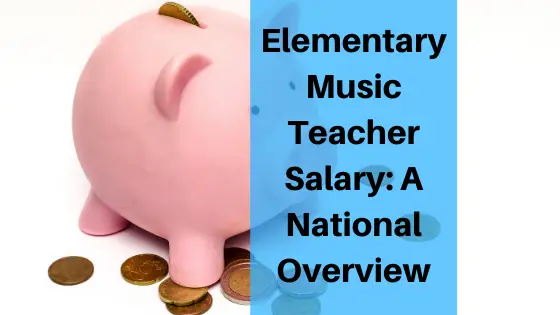Are you considering becoming an elementary music teacher but you want to know how much they make?
Do you already work as one but wonder how your school compares to other areas?
While money usually isn’t a top priority when becoming a teacher, you still want to make sure you can afford to feed your family and have the life you want.
So you’ll want to know an elementary music teacher’s salary.
Elementary music teacher salary varies greatly depending on state, private or public school, level of education, and amount of experience. In general, you can expect to be paid anywhere from $30,000 to $72,000 in a public school in America.
Read on for more details.
Table of Contents
How Much Do School Music Teachers Make?
According to Glassdoor’s elementary music teacher salary data, the average music teacher makes $46,744. This data is based on 1,397 anonymously submitted salaries to the site from across the nation.
Overall range of payment is form $30K to $72K. The range is dependent on state, level of education, and years of experience. The more you’ve worked and the more experience you have, the higher you generally get paid.
Music teachers (as long as they’re full-time) will get paid based on the same salary schedule as a general classroom teacher. Knowing this, we can look at the average pay for an elementary music teacher by state.
Note: Data on starting salary averages from the NEA Starting Teacher Salary study. Data on the average salary is from the Ranking Of The States 2018 also by the NEA.
| State | Starting Salary (17-18) | Average Salary (17-18) |
|---|---|---|
| Alabama | 38491 | 50568 |
| Alaska | 46954 | 69682 |
| Arizona | 34473 | 48723 |
| Arkansas | 33323 | 50544 |
| California | 46992 | 80680 |
| Colorado | 33483 | 52701 |
| Connecticut | 45922 | 74517 |
| Delaware | 41639 | 61795 |
| Florida | 37636 | 48168 |
| Georgia | 35474 | 56329 |
| Hawaii | 46790 | 57866 |
| Idaho | 34801 | 49225 |
| Illinois | 39236 | 65721 |
| Indiana | 35943 | 50614 |
| Iowa | 37048 | 57018 |
| Kansas | 35769 | 49754 |
| Kentucky | 36752 | 52952 |
| Louisiana | 40303 | 50359 |
| Maine | 34788 | 53815 |
| Maryland | 45147 | 69627 |
| Massachusetts | 45498 | 80357 |
| Michigan | 36599 | 61911 |
| Minnesota | 38529 | 57782 |
| Mississippi | 34784 | 44926 |
| Missouri | 32226 | 49304 |
| Montana | 31418 | 52766 |
| Nebraska | 34465 | 54213 |
| Nevada | 39054 | 54280 |
| New Hampshire | 37395 | 57833 |
| New Jersey | 51443 | 69917 |
| New Mexico | 36405 | 47152 |
| New York | 45589 | 84227 |
| North Carolina | 37631 | 51231 |
| North Dakota | 38611 | 52850 |
| Ohio | 35923 | 58000 |
| Oklahoma | 32010 | 46300 |
| Oregon | 36319 | 63061 |
| Pennsylvania | 44647 | 67535 |
| Rhode Island | 41689 | 66758 |
| South Carolina | 33148 | 50182 |
| South Dakota | 38098 | 47631 |
| Tennessee | 37305 | 50900 |
| Texas | 41481 | 53334 |
| Utah | 38499 | 49655 |
| Vermont | 38499 | 60556 |
| Virginia | 40453 | 51994 |
| Washington | 42240 | 55693 |
| West Virginia | 33715 | 45642 |
| Wisconsin | 38181 | 51469 |
| Wyoming | 45241 | 58352 |
How Much Money Does Elementary Music Teacher Make Per Hour?
Using some simple math, we can easily determine how much the average elementary music salary in per hour form.
First, we’ll take the average pay, $46,744, and divide it by the average hours worked per year, 1,983.4 hours according to the Brookings Institution, to get a total of $23.57 per hour.
Note: This data from the Brookings Institution doesn’t specify any extra time spent with after-school groups or preparing for concerts outside the school day.
What Are The Requirements To Become An Elementary Music Teacher?
There are three main ways to meet the requirements for becoming a music teacher. This section briefly goes over these methods.
Note: Each state has different requirements. Be sure to visit a state’s department of education for teacher requirements.
#1 Collegiate Program
Earning an Undergraduate or Graduate degree in Music Education is the most common way of meeting the requirements for becoming a music teacher.
As part of this program, you’ll develop both teaching and music skills through classes, lessons, and internships (commonly called student teaching).
At the end, you may have to also take a state certification test.
You may need to declare a specialty depending on the state. Some give certifications for music K-12 in band, orchestra, choir, and general music while others split these up into different certifications.
#2 Specialty Test/ Program
For those who already have a teaching degree/certification, a whole new degree isn’t required to become an elementary music teacher.
Many states will allow you to take a special state test to become certified. Some states may require a certain number of college credits in the subject area while others will just allow you to take the test.
Visit a state’s department of education to see their specific requirements.
#3 Loophole/ Experience
In some cases, the state’s language allows for any certified teacher to fill in as a music teacher. Most states strongly encourage the music teacher to have a music-specific certification, but most of these also allow for emergencies.
There are times when a school will hire someone they know for a music position despite their lack of specialized certification. While this is disappointing, it does allow for the teacher to gain certification through years of experience or by taking a special test (as mentioned previously).
Conclusion
Now you know a little about the elementary music teacher salary. $46,744 may seem like a lot (or not) depending on how much time you’re willing to put in, but it’s hard to put a price on the impact you can have.
(Does music make students get better grades? You bet it does!)
What do you think about the salary figures? How does yours line up?
Comment below and let’s have a conversation.

